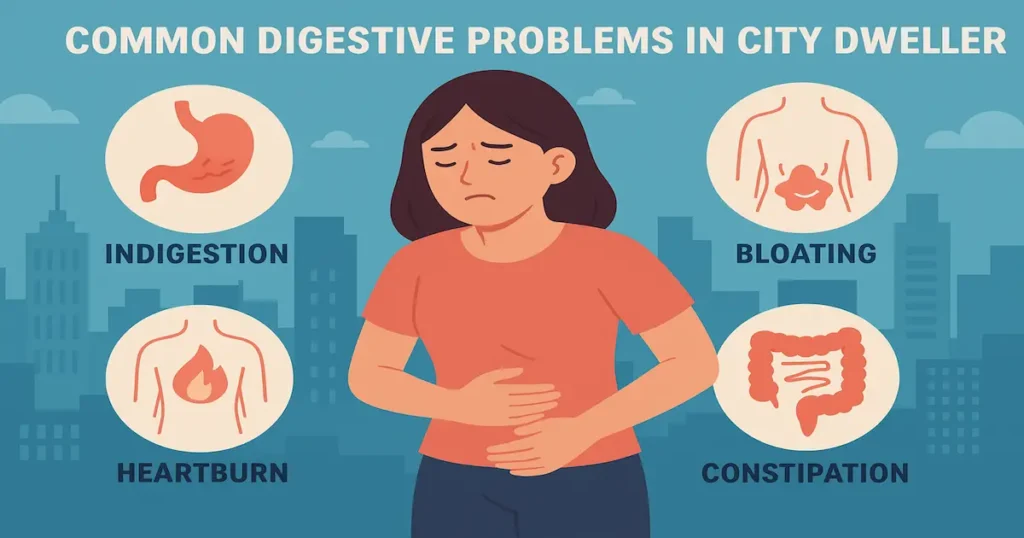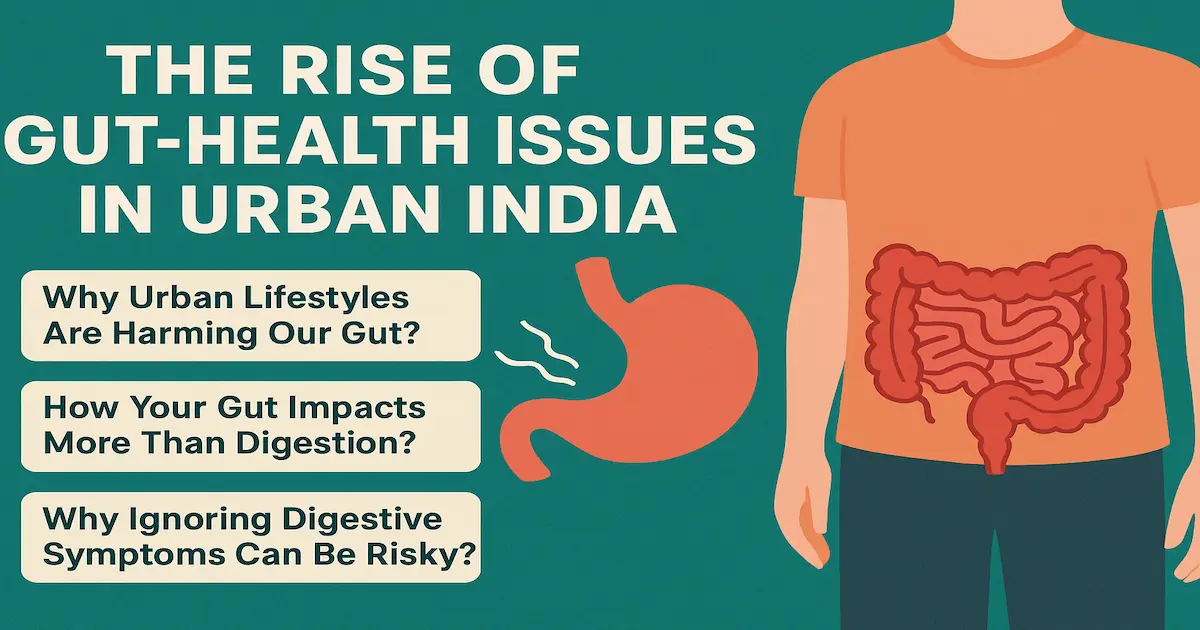The gut is often described as the body’s second brain because of its powerful influence on both physical and mental well-being.
It is home to trillions of microorganisms collectively known as the gut microbiome, which play an essential role in digestion, nutrient absorption, immunity, and even emotional health.
Modern medical research highlights that an imbalance in gut bacteria can trigger not only stomach issues but also conditions like anxiety, fatigue, and chronic inflammation.
As one health expert once said,
“Your gut is not just about digestion—it’s a command center for your overall health.”
This highlights why focusing on gut health is no longer optional but a necessity in today’s fast-paced urban environments.
Urban Lifestyle Factors Affecting Gut Health
Life in cities like Mumbai, Delhi, and Bangalore is characterized by fast food, air pollution, long working hours, and high stress levels. All of these elements contribute to poor gut health.
Processed foods, with high sugar and low fiber content, create imbalances in the microbiome. Pollution and contaminated water also introduce harmful pathogens that disrupt digestion.
Stress, often considered only a mental issue, is deeply connected with the gut through the gut-brain axis.
A recent survey found that more than 60% of urban residents reported suffering from acidity, bloating, or irregular bowel movements on a regular basis.
Read More: SimplySeven.net: Your Ultimate Guide to a Healthier Lifestyle
“We are eating faster, sleeping less, and stressing more—our gut is simply reacting to this imbalance,” noted a leading gastroenterologist in India.
Here’s a quick look at how urban factors influence gut health:
| Urban Factor | Impact on Gut Health |
|---|---|
| High stress levels | Triggers acidity, IBS, and poor digestion |
| Processed & fast foods | Reduces healthy bacteria and causes bloating |
| Air & water pollution | Introduces harmful microbes into the system |
| Irregular sleep patterns | Disrupts digestion and metabolism |
Common Digestive Problems in City Dwellers

Digestive problems have become some of the most frequent health complaints among city populations. Common issues include acidity, constipation, diarrhea, irritable bowel syndrome (IBS), and gastritis.
Many individuals often ignore these symptoms, dismissing them as minor discomforts, but over time, they can develop into serious conditions such as ulcers, colon inflammation, or even gastrointestinal cancers.
Urban diets, often lacking in fiber and rich in refined carbs, are a leading cause. Pair that with sedentary lifestyles, and you get an alarming rise in gut-health problems.
| Digestive Issue | Symptoms | Possible Long-Term Risks |
|---|---|---|
| Acidity & Heartburn | Burning sensation, chest discomfort | Ulcers, chronic gastritis |
| Constipation | Infrequent or hard stools | Hemorrhoids, colon issues |
| IBS | Abdominal pain, irregular bowels | Chronic inflammation |
| Diarrhea | Loose stools, dehydration | Nutritional deficiencies |
The Importance of Timely Medical Attention
In India’s urban centers, people often adopt a “wait and see” approach to health problems.
Unfortunately, digestive issues can worsen if left untreated. Regular medical check-ups, including endoscopies and stool tests when recommended, play a key role in early detection.
Doctors recommend that persistent symptoms like blood in stool, unexplained weight loss, chronic constipation, or severe abdominal pain should never be ignored. Seeking medical help early allows for treatment before issues escalate into chronic or life-threatening diseases.
Also Visit: Telemedicine’s Power: Making Healthcare Affordable for Everyone 2025
As one patient shared in an interview, “I ignored my stomach pain for months until it became unbearable. A quick check-up revealed ulcers, which could have been prevented if I had acted earlier.” This emphasizes how timely attention can literally save lives.
Everyday Habits to Improve Gut Health
Despite the challenges, simple daily practices can make a big difference in gut health. A balanced diet rich in fiber, fresh fruits, vegetables, and probiotics can strengthen gut bacteria.
Staying hydrated, practicing stress management techniques like meditation, and ensuring adequate sleep are equally crucial.
Regular exercise is another often-overlooked factor. Even a 30-minute walk daily improves digestion and reduces bloating. Making these small changes consistently can bring significant improvements.
When to See a Doctor?
You should not delay seeing a gastroenterologist if you experience:
- Persistent acidity or heartburn for more than two weeks
- Blood in stool or black/tarry stool
- Sudden unexplained weight loss
- Severe abdominal pain or cramps
- Chronic constipation or diarrhea
- Difficulty swallowing food
These are red flags that your gut may need medical attention. Early diagnosis not only prevents bigger complications but also ensures faster recovery.
Moving Towards a Healthier Future
The rise of gut-health issues in urban India serves as a warning and a lesson for populations worldwide, especially in regions like the USA, where fast-paced lifestyles closely mirror those in Indian cities.
By acknowledging the link between lifestyle and gut health, people can make better choices for their well-being.
To move toward a healthier future, governments, healthcare providers, and individuals must work together to spread awareness about digestive health.
Urban wellness initiatives, corporate health programs, and public campaigns on nutrition and stress reduction can help reduce the growing burden of gut-related illnesses.
Ultimately, the message is clear: our gut reflects the life we lead. By slowing down, eating better, managing stress, and valuing preventive healthcare, we can rewrite the story of gut health in urban societies.
“Healing your gut is not just about fixing your stomach—it’s about giving your body the foundation it needs for lasting health.”












